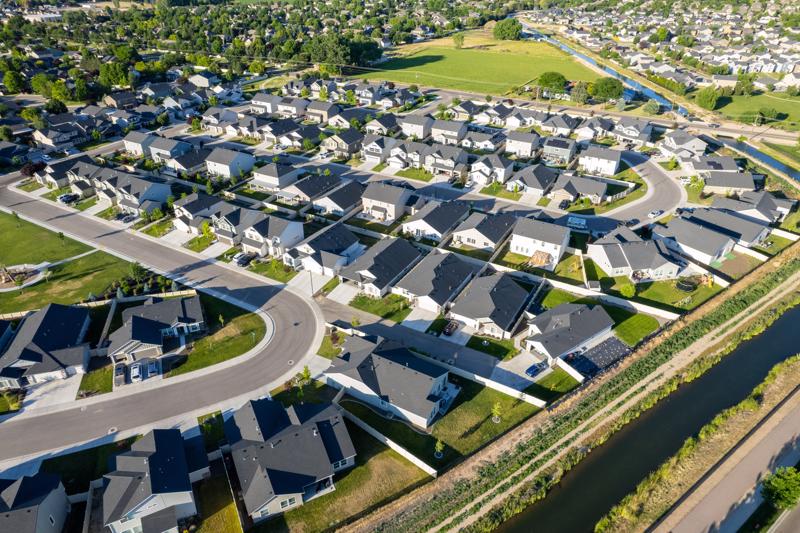In the 37 industrialized economies belonging to the OECD, nominal house prices in the third quarter of 2023 in...
In the 37 industrialized economies belonging to the OECD, nominal house prices in the third quarter of 2023 increased by 2.1% compared to the previous quarter, marking a departure from almost stagnant growth since the beginning of the previous year.

The widespread decline in real estate prices in developed economies has essentially ended - according to an analysis by the Financial Times based on data from the Organization for Economic Cooperation and Development (OECD). Many economic experts believe that the deepest downturn in the global real estate market in the past decade has reached a turning point.
In the 37 industrialized economies within the OECD, nominal house prices in the third quarter of 2023 increased by 2.1% compared to the previous quarter, marking a departure from almost stagnant growth since the beginning of the previous year. Only about one-third of these countries reported a decline in house prices in the third quarter compared to the previous quarter, compared to more than half of the countries reporting such data at the beginning of the year.
"The latest data shows that house prices have bottomed out in most countries. I believe we have passed the housing price adjustment period," said Andrew Wishart, chief economist at the economic research company Capital Economics.
House prices in developed economies began to decline in late 2022 after major central banks raised interest rates the most in decades to combat inflation. In OECD countries, house prices increased by only 0.6% compared to the previous quarter in the fourth quarter of 2022, the weakest nominal increase since 2012.
However, the rate of decline in house prices has slowed down and even reversed in many economies, as expectations that central banks will cut interest rates this year have helped reduce mortgage rates. The scarcity of homes for sale has also boosted house prices.
House prices are rebounding or stabilizing in most developed countries, while prices in other countries are declining at a slower pace. Wishart said prices may further decline in some countries like Germany, Denmark, and Sweden - countries with larger rental markets, "but even in these economies, we believe that house prices are nearing the bottom."
Tomasz Wieladek, an economic expert at investment firm T Rowe Price, said house prices are "nearing the bottom in many places and recovering in many places." He said migration and government restrictions on new projects have put pressure on house prices in many countries, including the UK, Canada, and Australia.
Households will continue to face higher mortgage costs when their fixed-rate mortgage contracts expire, but many households are starting to enjoy better borrowing terms than last year. Although mortgage rates in the UK and US have risen in February this year, they are still much lower than the peaks set in each country in 2023.
House prices in the US are holding up well at high levels, partly due to solid economic growth and employment in the country. Nominal house prices in the US increased by 5.2% over the past year until November 2023.
In contrast, Germany - a country with an economic crisis, overpriced real estate, and a large rental market - saw house prices fall by 10.2% last year. This is the worst decline among real estate markets in EU countries (excluding Luxembourg).
Data from Australia and New Zealand show that house prices in these countries are rebounding. In South Korea, house prices have stabilized after hitting bottom in mid-2023. In the EU, house prices rose by a nominal 0.8% in the third quarter of 2023, reversing the downward trend at the beginning of the year, although still lower by 1% compared to the same period last year - according to data from the Eurostat statistical agency.
Sylvain Broyer - chief economist for emerging markets at credit rating agency S&P Global Ratings - said: "We believe that the real estate adjustment phase in Europe is still not over, but perhaps the worst phase is over." The expert believes that the adjustment of house prices will continue to occur in some countries due to high mortgage interest rates and possible reductions in construction costs.
However, Broyer believes that the remaining adjustment will be modest.
The global decline in house prices over the past year has generally been less severe than expected. Credit rating agency Fitch now estimates that nominal house prices increased by 6% in the US last year, instead of the projected 5% decrease. In the UK, Fitch's estimate of house prices fell by 2% in 2023, compared to the previously forecasted 7% decline by Fitch.
In some economies, including the US, Australia, and the UK, the real estate market has shown unexpected signs of recovery, and the decline in house prices over the past year has not eroded all the gains made during the pandemic, both in nominal and real terms.
But in some non-OECD countries, the story of the real estate market is entirely different. Regarding China, a country facing a severe real estate crisis, Fitch predicts that house prices will continue to decline over the next 2 years, while warning that real estate investment demand in this country has "virtually disappeared" after house prices fell by 7% in the last 2 years.
Via VnEconomy